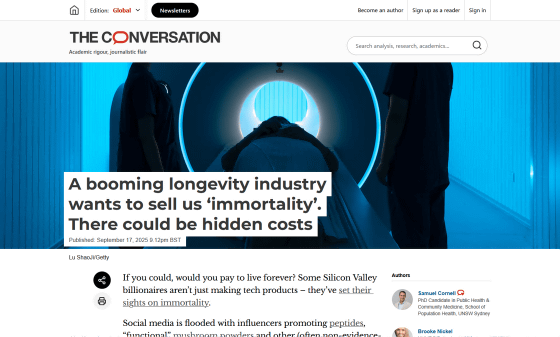What's the problem with the longevity industry trying to sell 'immortality' to billionaires?

Immortality and eternal life have long been a fascination for many powerful people, and many modern billionaires aspire to immortality. While the 'longevity industry,' which targets people seeking immortality, is booming, Samuel Cornell, a doctoral student at the School of Population Health
A booming longevity industry wants to sell us 'immortality'. There could be hidden costs
https://theconversation.com/a-booming-longevity-industry-wants-to-sell-us-immortality-there-could-be-hidden-costs-264879

Social media is flooded with influencers promoting products that claim to extend lifespan, such as peptides and functional mushroom powders, and services like ice baths, saunas, and cryotherapy chambers aimed at people who want to live longer or look younger. However, behind these social media posts and marketing are commercial interests targeting people who fear aging and death.
First, Cornell and his colleagues explain from an evolutionary perspective why no human can live forever. Some may wonder, 'It's obviously better for living things to live longer, so why haven't we been able to achieve immortality through the process of evolution?' However, the mechanism of evolution is specialized in the 'ability to produce the next generation,' and prioritizes 'genes that promote reproduction and adaptation,' while 'genes that promote infinite lifespan' are less susceptible to evolutionary influence.
The ancient Greeks handed down cautionary tales about eternal life, in which those who sought immortality were made to understand that it usually came at a great price. For example, in Greek mythology, Tithonus prayed for immortality and was granted eternal life, but he forgot to pray for immortality, and so suffered endless aging and decay.

The global longevity industry is booming, backed by venture capitalists, big-name investors, and pharmaceutical companies, but much of this funding is being poured into products and services with little or no evidence of how they improve health or extend lifespan.
Yet even those who achieve wealth and fame persist in their quest for eternal life. American venture capitalist Brian Johnson reportedly spends millions of dollars and undergoes constant medical tests in his impossible quest to 'never die.'
Johnson's 'longevity regimen' includes a strict diet, hundreds of supplements, strict sleep and exercise routines, and even

The problem with the longevity industry, Cornell and others say, is that it prioritizes profit over evidence. The 'innovations' at the heart of the industry attract investors looking to hack the aging process, but these innovations are rarely backed by high-quality evidence.
For example, 'whole-body MRIs' are touted as a way to detect cancer and other abnormalities early, but
Additionally, while the longevity industry markets itself as an alternative to the existing healthcare system, it relies on it to function: relying on hospital and clinic facilities and specialists for the necessary scans, blood tests and experimental treatments, it places unnecessary strain on already understaffed health services while not benefiting the vast majority of the population.

Cornell and his colleagues describe the longevity industry as a form of ' disease peddling ' that portrays normal aging as a medical problem. They say this risks permeating ageism into everyday life and leading people to view normal aging as a disease rather than accepting it as a part of life. This could also divert attention and resources from basic public health services that improve people's quality of life as they get older.
'Much of the unfounded longevity hype distracts us from what we already know works: regular exercise, a healthy diet, adequate sleep, meaningful relationships, and equitable access to evidence-based medical care,' Cornell and his colleagues argued.
Related Posts:
in Science, Posted by log1h_ik







